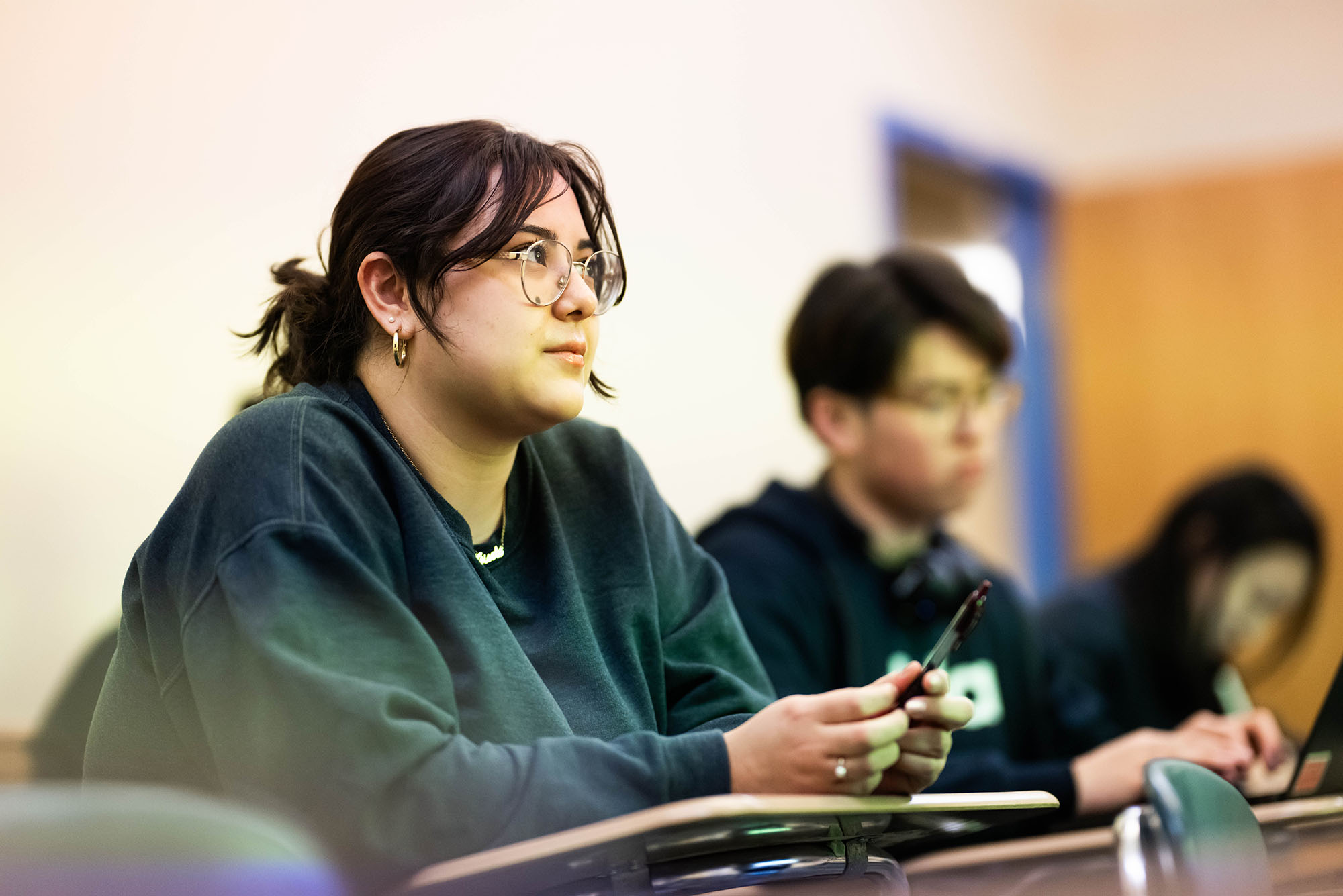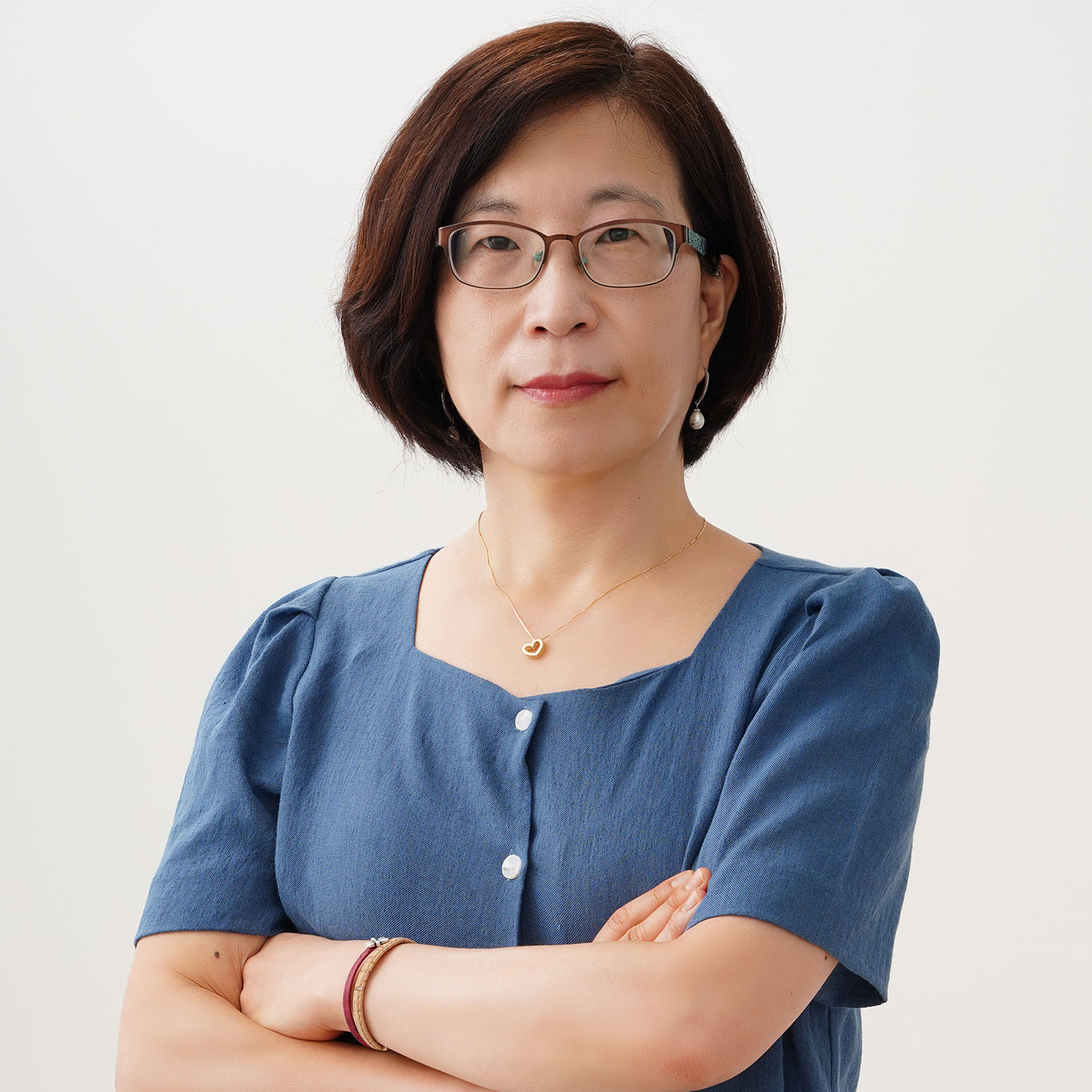Korean Language, Literature, and Culture Is Booming at BU
BU professor: what’s behind the renaissance

Gisele Sanchez (CAS’25) was in high school in Texas when she fell for the K-pop hits of the Korean boy band BTS. Now she’s majoring in Korean language and literature.
Korean Language, Literature, and Culture Is Booming at BU
BU professor: what’s behind the renaissance
Yoon Sun Yang remembers smelling tear gas on her junior high school playground in Seoul back in the late 1980s, as the South Korean people rose up against decades of military dictatorship.
Three decades later, Gisele Sanchez was in high school, down in San Antonio, Tex., in the late 2010s, when she fell for the K-pop hits of the Korean boy band BTS.
They are two chapters of the same story.

Yang is now a College of Arts & Sciences associate professor of Korean and comparative literature at Boston University, and Sanchez (CAS’25) is one of her students, majoring in the new Korean studies program. She no longer follows the K-pop scene so closely, but she’s considering a future as a translator of Korean literature.
Yang says the people’s rebellion of her adolescence freed Korea to become the global cultural powerhouse that won over Sanchez and so many others.
“It’s a sort of Renaissance,” she says.
Last year, 518 students signed up for Korean program classes, up from 388 in the 2019-2020 school year, a jump of 33 percent. As of fall 2024, the Republic of Korea’s international student enrollment of 410 was third at BU, behind only China and India. An additional 158 students are Korean citizens, but are US permanent residents. The CAS department of languages and literatures Korean program has a broad spectrum of heritage and non-heritage learners—students who grew up the United States, in Korea, or elsewhere, those with no ties to Korea save for their interest in K-pop, but who want to know more about Korean culture, and those simply interested in fulfilling BU Hub requirements.
“Literature, culture, and language are not separable,” Yang says.
The major, formally titled the Bachelor of Arts in Korean Language & Literature, officially launched in fall 2023 and has already attracted a handful of students, including Sanchez. The faculty decided it was time for a major when a few students declared comparative literature as a major while focusing on Korean studies, Yang says. A minor had been in place for several years.
Korean or Korean-heritage students who enroll in the classes often are looking to sharpen their language skills or connect more deeply with their culture, she says. While K-pop was the initial draw for many non-Korean students, some have goals that include a career in international relations or business. One graduate now works for a K-pop management firm.
“Korea was part of all the stories of East Asian cultural flows, and it’s often kind of left out of the story in modern scholarship,” says Sarah Frederick, a professor of Japanese and associate chair of the world languages and literatures department. “We have a large Korean-American community in this country, and I think it’s important to respect that community.
“We did have quite a strong Korean language program that started even before I came to BU in 2000,” she says. “We just had a couple of years of Korean [classes], but a lot of schools, you know, very elite schools, didn’t have any Korean language program at all. So, I thought that was a great foundation.”
In 2011, Frederick obtained a grant from the Korea Foundation, founded in 1991, that supported the first tenure track professorship in Korean literature, which went to Yang. The faculty consisted of Yang and a couple of lecturers teaching the language. Today the program’s faculty comprises Yang and Dennis Wuerthner, a specialist in premodern Korean literature, along with four full-time and two part-time lecturers on the language side. Yang says there are plans to add a faculty member to teach Korean history or another subject outside language and literature, and students can now spend a semester in South Korea through BU’s study abroad program.
History produced the Korean boom
Cultural freedom in Korea was a long time coming, Yang says.
“Korea was colonized by Japan between 1910 and 1945,” she says, followed by partition into north and south. “It experienced a tremendous war, and after that, a long military dictatorship. So I tell my students Korea was under severe censorship between 1907 and 1987. Almost a century of censorship.”
Democratization in the late 1980s “was the main impetus of South Korea’s cultural growth globally,” Yang says. “Everything up to that point was controlled, but after 1988, people started to talk about various issues.” Some revisited the upheaval in art, while others imported various cultures, such as western music. Korean art and culture changed and grew quickly across the board.
It took years, though. To many Americans, the boom began with Psy taking “Gangnam Style” to the top of the charts in 2012, which prompted the first big growth in the Korean program. (Fun fact: Psy actually attended BU for a semester, in 1997). In the following years, BTS and other K-pop groups attracted global audiences. More attention came with the hit Netflix series Squid Game, created by a Korean filmmaker, and the 2019 film Parasite, the first foreign film in history to win the Academy Award for best picture.
But Yang says the influence is much wider than the entertainment industry: “The Korean food thing is big. Stop & Shop has Korean ramen!”
She says that when she came to the United States as a student in 1998, “people warned me not to buy things made in Korea, because they will break easily, right? And when I was in grad school here in the 2000s, many people asked me, ‘Why are you studying Korean anyway? And where is Korea?’
“But around 2001, I sensed something was different. I walked into Best Buy and saw the appliances made in Korea were the most expensive ones. The shift was amazing.
“At first when I started teaching as a grad student, I felt like I would struggle to convince my students why we study Korean literature. ‘Why is it important?’ But I don’t have to do that job now,” she says. First and foremost she credits cultural growth—“soft power.”
Sanchez is an excellent example.
“When I was in high school, it was about when BTS started to really blow up. And I had seen dance videos and stuff that my friends showed me, and I just really was drawn to the way the language sounded,” she says. “I mean, I’ve been trying my whole life to learn Spanish, and I’m still not fluent in that. I’m third or fourth generation. And it was always a big insecurity of mine, especially because all my peers spoke Spanish fluently because their parents were from Mexico. I think I took [Korean] up because it was a new thing, and there was not as much pressure as Spanish.”
Learning the language took her deeper into Korean culture. “I’d been studying Korean on my own in high school, but it was when I read the book Almond by Sohn Won-Pyung, I saw that the translator’s name was in the book and I was like, that’s a job I can do,” Sanchez says. “I just got swept up in it. I fell in love with the storytelling. In Almond it was very plain almost, but very intricate at the same time, the characters were very intricate, and I just really enjoyed it.”
Wuerthner studies and teaches Classical Korean and Korea’s role in the “Sinographic Sphere,” the pre-20th century cultures of China, Korea, Japan, and Vietnam, which traditionally relied on this Chinese script and literary language.
“Many students attend my classes because of their interest or even love for contemporary South Korean pop-culture, and I find it exciting and rewarding to introduce them to, and educate them in, the rich East Asian/Korean culture that lies below and beyond this,” Wuerthner says. “Literature can really serve as a bridge over the flood of time, and students usually take away a lot from this.”
Case in point: Sanchez.
“I learned Korean history through literature [in Wuerthner’s classes]. His lectures are very structured that way, and he gives you lots of context,” Sanchez says. “A lot of his discussions are like, this is what’s happening, how can we understand that world at the time through this. We learn a lot about history and society and how it’s changed.”
She even spent last summer in Korea, taking classes at Chungbuk National University in the city of Cheongju, south of Seoul, through the American Councils for International Education. “I had a language partner and they also offered cultural excursions. So I got to see, eat, and drink lots of things. It was fun.”
And how were her language skills?
“At first I was very nervous,” she says. “I didn’t even speak when I first landed, but after a while I was able to make some friends who were Korean, and my Korean out of necessity just kind of came out. And I realized I know a little bit more than I thought!”
Comments & Discussion
Boston University moderates comments to facilitate an informed, substantive, civil conversation. Abusive, profane, self-promotional, misleading, incoherent or off-topic comments will be rejected. Moderators are staffed during regular business hours (EST) and can only accept comments written in English. Statistics or facts must include a citation or a link to the citation.